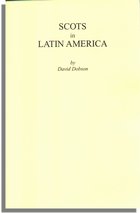Although Scots are known to have ventured to Latin America as early as 1540 (mostly as soldiers of fortune), emigration from Scotland to Latin America only began in earnest after Spanish power in the western hemisphere began to wane. Following the end of the Napoleonic Wars in 1815, demobilized soldiers and sailors, Scots among them, flocked to aid the Latin American revolutionaries in their fight for liberty from Spain. Spain’s ouster removed restrictions on immigration, with the result that Scottish passengers and investors flocked to the area. As early as 1825, for example, the Norval, the Symetry, and the Harmony set sail for Argentina with Scottish bricklayers, implement makers, blacksmiths, farmers, and other skilled tradesmen.
David Dobson’s latest volume on Scottish emigration is the first work to enumerate the members of this 19th-century exodus. Dobson’s findings are based on primary sources in Scotland, especially documents in archives, newspapers, and cemetery transcriptions. The settlers, with annotations, are listed in alphabetical order by surname. While there is considerable variance from description to description, each entry identifies the passenger by country (and sometimes city) of origin, a date when the immigrant was known to have resided in Latin America, and the source of the information. The majority of the entries also provide one or more of the following pieces of information: occupation, age, parent(s)’ name(s), place of birth in Scotland, and date of arrival in Latin America. Researchers will be interested to learn that 19th-century Scotsmen turned up in a number of Latin American countries, including Argentina, Belize, Bolivia, Brazil, British Guiana, Chile, Colombia, Peru, Uruguay, and Venezuela. In identifying more than 1,500 Scots immigrants to Latin America, Mr. Dobson’s latest book does not purport to be the definitive work on its subject; nonetheless, it unquestionably breaks new ground for students of immigration and Scottish genealogy.


